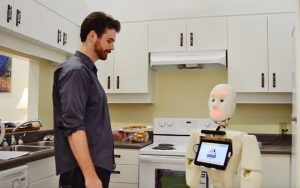 November 22, 2017 – Professor Goldie Nejat was recently featured in a news article focusing on eldercare by NBC News. Casper, a robot designed to work with institutionalized patients suffering from dementia, was developed in Professor Nejat’s Autonomous Systems and Biomechatronics Laboratory.
November 22, 2017 – Professor Goldie Nejat was recently featured in a news article focusing on eldercare by NBC News. Casper, a robot designed to work with institutionalized patients suffering from dementia, was developed in Professor Nejat’s Autonomous Systems and Biomechatronics Laboratory.
“There’s been some research which suggests that you can delay the onset or progression of dementia through repeated cognitive stimulation and social engagement,” Nejat says. “So we thought, can you use a robot to increase the amount of stimulation these people get?”
How does Casper do it all? The robot features numerous sensors, including laser scanners that let it navigate its environment and avoid obstacles as well as 3D optical scanners that recognize everything from bingo cards to kitchen utensils. It also has microphones that can decode human speech even in noisy environments.
But what makes Casper really special is its ability to make complex decisions and to learn based on the reactions it elicits in the sometimes severely compromised humans with whom it interacts. The key is the robot’s “brain,” a microchip that’s programmed to observe patients’ speech, facial expressions, and body language and quantify their emotional states.
“To deal with these type of patients, it’s really important that the robot is emotionally sensitive to some degree,” Nejat says. “These patients can have good days and bad days so the robot has to be aware that now may not be the right time, and to try again on a different day.”